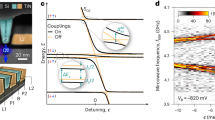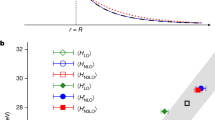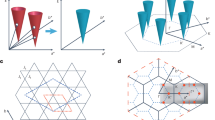Abstract
IN certain radicals, sometimes referred to as σ-radicals1,2, the contribution to the orbital of the unpaired electron from one or more of the atoms involved includes a relatively high atomic s character, and this is manifested as a large isotropic hyperfine coupling. It is customary to estimate the s character by dividing this isotropic coupling by a calculated value (A0) for a spin density of unity in the appropriate orbital2. For π-radicals the isotropic hyperfine coupling constants of which are a consequence of spin-polarization or configuration interaction, however, the value is generally related, not to the atomic value, A0, but to the value (Q) that would have been obtained had the spin density in the p orbital of the atom concerned been unity.
This is a preview of subscription content, access via your institution
Access options
Subscribe to this journal
Receive 51 print issues and online access
$199.00 per year
only $3.90 per issue
Buy this article
- Purchase on Springer Link
- Instant access to full article PDF
Prices may be subject to local taxes which are calculated during checkout
Similar content being viewed by others
References
Symons, M. C. R., J. Chem. Soc., 2276 (1965).
Atkins, P. W., and Symons, M. C. R., The Structure of Inorganic Radicals, 3 (Elsevier, 1966).
Gross, J. M., and Symons, M. C. R., J. Chem. Soc., A, 451 (1966).
Author information
Authors and Affiliations
Rights and permissions
About this article
Cite this article
HUNTER, T., SYMONS, M. Spin Polarization in Atoms and π-Radicals. Nature 213, 1121–1122 (1967). https://doi.org/10.1038/2131121b0
Received:
Published:
Issue Date:
DOI: https://doi.org/10.1038/2131121b0
Comments
By submitting a comment you agree to abide by our Terms and Community Guidelines. If you find something abusive or that does not comply with our terms or guidelines please flag it as inappropriate.



